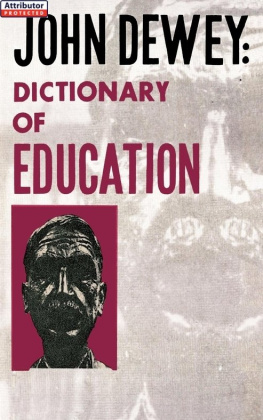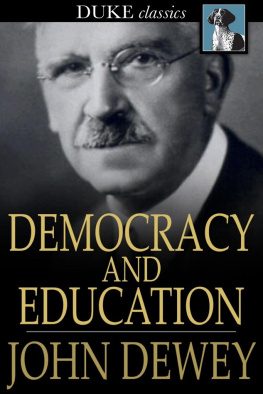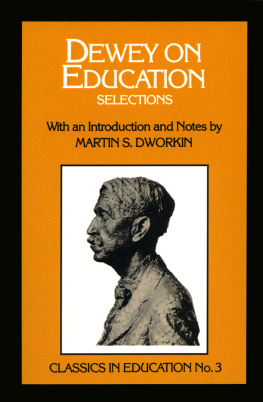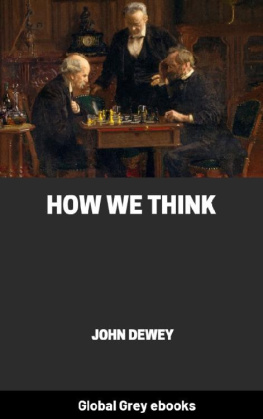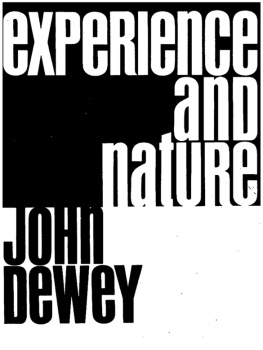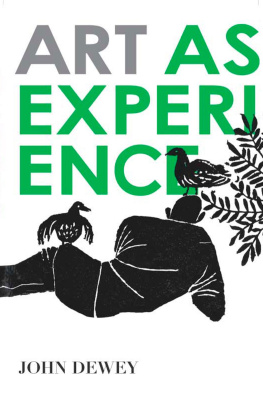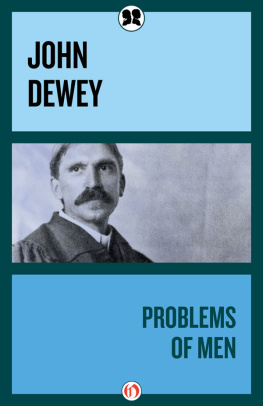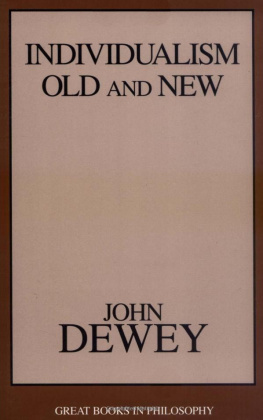John Dewey - The Public and Its Problems
Here you can read online John Dewey - The Public and Its Problems full text of the book (entire story) in english for free. Download pdf and epub, get meaning, cover and reviews about this ebook. year: 2016, publisher: Ohio University Press, genre: Politics. Description of the work, (preface) as well as reviews are available. Best literature library LitArk.com created for fans of good reading and offers a wide selection of genres:
Romance novel
Science fiction
Adventure
Detective
Science
History
Home and family
Prose
Art
Politics
Computer
Non-fiction
Religion
Business
Children
Humor
Choose a favorite category and find really read worthwhile books. Enjoy immersion in the world of imagination, feel the emotions of the characters or learn something new for yourself, make an fascinating discovery.

- Book:The Public and Its Problems
- Author:
- Publisher:Ohio University Press
- Genre:
- Year:2016
- Rating:4 / 5
- Favourites:Add to favourites
- Your mark:
- 80
- 1
- 2
- 3
- 4
- 5
The Public and Its Problems: summary, description and annotation
We offer to read an annotation, description, summary or preface (depends on what the author of the book "The Public and Its Problems" wrote himself). If you haven't found the necessary information about the book — write in the comments, we will try to find it.
The Public and Its Problems — read online for free the complete book (whole text) full work
Below is the text of the book, divided by pages. System saving the place of the last page read, allows you to conveniently read the book "The Public and Its Problems" online for free, without having to search again every time where you left off. Put a bookmark, and you can go to the page where you finished reading at any time.
Font size:
Interval:
Bookmark:
THE PUBLIC AND ITS PROBLEMS
THE PUBLIC AND ITS PROBLEMS
An Essay in Political Inquiry
John Dewey
Edited and with an Introduction by Melvin L. Rogers
SWALLOW PRESS
ATHENS, OHIO
Swallow Press An imprint of Ohio University Press, Athens, Ohio 45701 ohioswallow.com
Copyright 1927 by Henry Holt and Company Copyright 1954 by Mrs. John Dewey This edition copyright 2016 by Ohio University Press All rights reserved
To obtain permission to quote, reprint, or otherwise reproduce or distribute material from Swallow Press / Ohio University Press publications, please contact our rights and permissions department at (740) 593-1154 or (740) 593-4536 (fax).
Portions of Melvin L. Rogerss introduction first appeared in Introduction: Revisiting The Public and Its Problems and John Dewey and His Vision of Democracy, both in Revisiting The Public and Its Problems, special issue, Contemporary Pragmatism 7, no. 1 (2011): 19, 6992.
Printed in the United States of America Swallow Press / Ohio University Press books are printed on acid-free paper 
26 25 24 23 22 21 20 19 18 17 16 5 4 3 2 1
Library of Congress Cataloging-in-Publication Data
Names: Dewey, John, 18591952, author. | Rogers, Melvin L., editor.
Title: The public and its problems : an essay in political inquiry / John Dewey; edited and with an introduction by Melvin L. Rogers.
Description: Athens, Ohio : Swallow Press, 2016. | Includes bibliographical references and index.
Identifiers: LCCN 2016020374| ISBN 9780804011662 (paperback) | ISBN 9780804040730 (pdf)
Subjects: LCSH: Democracy. | Political science. | State, The. | BISAC: POLITICAL SCIENCE / General.
Classification: LCC JC251 .D47 2016 | DDC 321.8dc23
LC record available at https://lccn.loc.gov/2016020374
printed with seasons grant
Figure Foundation
oneness of states, full unity
Contents
Melvin L. Rogers
John Dewey, The Public and Its Problems: An Essay in Political Inquiry
Divergence of facts and theoretical interpretations concerning the nature of the state. Practical import of theories. Theories in terms of causal origin. Theory in terms of perceived consequences. Distinction of private and public substituted for that of individual and social. The influence of association. Plurality of associations. Criterion of the public. Function of the state. The state as an experimental problem. Summary.
Public and state. Geographical extent. Multiplicity of states. Spread of consequences. Law is not command. Law and reasonableness. The public and long-established habits of action. Fear of the new. Irreparable consequences. Variation of state-functions according to circumstances of time and place. State and government. State and society. The pluralistic theory.
Private and representative rles of officials. Selection of rulers by irrelevant methods. The problem of control of officials. Meanings of democracy. Fallacy as to origin of democratic government. Influence of non-political factors. The origin of individualism. Influence of the new industry; the theory of natural economic laws. James Mills philosophy of democratic government. Criticism of individualism. Criticism of antithesis of natural and artificial. Wants and aims as functions of social life. Persistence of pre-industrial institutions. Final problem.
Local origin of American democratic government. National unification due to technological factors. Submergence of the public. Disparity of inherited ideas and machinery with actual conditions. Illustrations of resulting failures. Problem of discovering the public. Democracy versus the expert. Explanation of eclipse of public. Illustrated by the World War. Application of criteria of the public. Failure of traditional principles. Political apathy accounted for. Need of experts. Rivals of political interest. Ideals and instrumentalities.
Democracy as idea and as governmental behavior. Problem of the Great Community. Meaning of the democratic ideal. Democracy and community life. Community and associated activity. Communication and the community. Intellectual conditions of the Great Community. Habit and intelligence. Science and knowledge. Limitations upon social inquiry. Isolation of social inquiry. Pure and applied science. Communication and public opinion. Limitations of distribution of knowledge. Communication as art.
Antithesis between individual and social as obstruction to method. Meaning of individual. Where opposition lies. Meaning of absolutistic logic. Illustration from doctrine of evolution. From psychology. Difference of human and physical science. Experimental inquiry as alternative. Method, and government by experts. Democracy and education by discussion. The level of intelligence. The necessity of local community life. Problem of restoration. Tendencies making for restablishment. Connection of this problem with the problem of political intelligence.
Acknowledgments
I would like to thank former students at Carleton College (20057) for their suggestions on the introduction. I extend thanks to Kendra Boileau of Penn State University Press, Gillian Berchowitz of Ohio University Press for her commitment to the project, the original reviewers of the manuscript, the editorial staff, and Colin Koopman of the University of Oregon, Jack Turner of the University of Washington, Christopher Lbron of Yale University, Eric MacGilvray of Ohio State University, Eddie Glaude of Princeton University, and my original research assistant, David Novitsky, at the University of Virginia, all of whom provided helpful suggestions in preparing this volume. As always, support from my partner, Frederick Godley, has sustained me in working on this project.
Melvin L. Rogers
Chronology
| 1859, October 20 | John Dewey is born in Burlington, Vermont |
| 1879 | Receives AB from the University of Vermont |
| 187981 | Teaches at high school in Oil City, Pennsylvania |
| 188182 | Teaches at Lake View Seminary, Charlotte, Vermont |
| 188284 | Attends graduate school at Johns Hopkins University |
| 1884 | Receives PhD from Johns Hopkins University |
| Instructor in the Department of Philosophy at the University of Michigan | |
| 1886 | Married to Alice Chipman |
| 1887 | Psychology |
| 1888 | Leibnizs New Essays Concerning the Human Understanding: A Critical Exposition |
| The Ethics of Democracy (first published reflection on democracy) | |
| 188889 | Professor of mental and moral philosophy at the University of Minnesota |
| 1889 | Chair of Department of Philosophy at the University of Michigan |
| 1891 | Outlines of a Critical Theory of Ethics |
| 1894 | Professor and chair of Department of Philosophy (including psychology and pedagogy) at the University of Chicago |
| The Study of Ethics: A Syllabus | |
| 1896 | Founder of the University of Chicago Laboratory School (officially University Elementary School) |
| 1897 | Elected to board of trustees, Hull House Association (originally a settlement house for recently arrived European immigrants) |
| 1899 | The School and Society |
| 18991900 | President of the American Psychological Association |
| Studies in Logical Theory | |
| 1904 | Professor of philosophy at Columbia University and Teachers College |
Font size:
Interval:
Bookmark:
Similar books «The Public and Its Problems»
Look at similar books to The Public and Its Problems. We have selected literature similar in name and meaning in the hope of providing readers with more options to find new, interesting, not yet read works.
Discussion, reviews of the book The Public and Its Problems and just readers' own opinions. Leave your comments, write what you think about the work, its meaning or the main characters. Specify what exactly you liked and what you didn't like, and why you think so.

